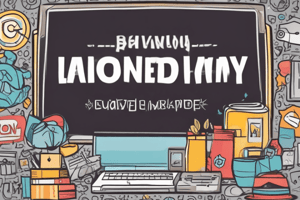Podcast
Questions and Answers
What is the perception created in the consumer's mind regarding the nature of a company and its products relative to the competition?
What is the perception created in the consumer's mind regarding the nature of a company and its products relative to the competition?
- Branding
- Positioning (correct)
- Advertising
- Marketing
An ___________________ is a mental position taken toward a topic, person, or event, which influences the holder's feelings, perceptions, learning processes, and subsequent behaviors.
An ___________________ is a mental position taken toward a topic, person, or event, which influences the holder's feelings, perceptions, learning processes, and subsequent behaviors.
Attitude
A ____________________ is a symbol used to identify a company and its brands, helping to convey the corporate image.
A ____________________ is a symbol used to identify a company and its brands, helping to convey the corporate image.
Logo
____________________ brands are proprietary brands marketed by an organization and normally distributed exclusively within the organization's outlets.
____________________ brands are proprietary brands marketed by an organization and normally distributed exclusively within the organization's outlets.
Brand ________________ means customers purchase only one brand. They consider no other brand, regardless of price differences.
Brand ________________ means customers purchase only one brand. They consider no other brand, regardless of price differences.
What method involves a consumer choosing the brand that they like the best without evaluating other options?
What method involves a consumer choosing the brand that they like the best without evaluating other options?
____________________ segmentation focuses on the advantages consumers receive from a product rather than the characteristics of consumers themselves.
____________________ segmentation focuses on the advantages consumers receive from a product rather than the characteristics of consumers themselves.
What marketing strategy combines census data with psychographic information?
What marketing strategy combines census data with psychographic information?
__________ are strongly held beliefs about various topics or concepts and lead to the judgments that guide personal behaviors.
__________ are strongly held beliefs about various topics or concepts and lead to the judgments that guide personal behaviors.
A _______________ name is assigned to an individual good or service or to a group of complementary products.
A _______________ name is assigned to an individual good or service or to a group of complementary products.
What does a corporate ____________ consist of?
What does a corporate ____________ consist of?
Corporate names do not reflect a company's goods or services.
Corporate names do not reflect a company's goods or services.
Brand __________________ is the use of an established brand name on goods or services that are not related to the core brand.
Brand __________________ is the use of an established brand name on goods or services that are not related to the core brand.
What type of marketing results from sales where individuals buy a product at work and then purchase one for personal use?
What type of marketing results from sales where individuals buy a product at work and then purchase one for personal use?
The _____________________________ model assumes that a consumer's attitude toward a brand is determined by the consumer's beliefs about a brand's performance on each attribute and the importance of each attribute to the consumer.
The _____________________________ model assumes that a consumer's attitude toward a brand is determined by the consumer's beliefs about a brand's performance on each attribute and the importance of each attribute to the consumer.
Market _______________________ is the process of dividing a market into meaningful, relatively similar, identifiable segments or groups.
Market _______________________ is the process of dividing a market into meaningful, relatively similar, identifiable segments or groups.
The __________________ set holds the brands that the consumer is aware of but the individual has neither negative nor positive feelings about the products.
The __________________ set holds the brands that the consumer is aware of but the individual has neither negative nor positive feelings about the products.
What is the coordination and integration of all marketing communication tools, avenues, and sources in a company called?
What is the coordination and integration of all marketing communication tools, avenues, and sources in a company called?
An _________________ information search takes place when the consumer mentally recalls images of products that might fulfill or meet the need.
An _________________ information search takes place when the consumer mentally recalls images of products that might fulfill or meet the need.
When consumers believe that most brands provide the same set of attributes, the result is brand ______________.
When consumers believe that most brands provide the same set of attributes, the result is brand ______________.
___________________ emerge from patterns of responses, which reveal a person's attitudes, interests, and opinions (AIO).
___________________ emerge from patterns of responses, which reveal a person's attitudes, interests, and opinions (AIO).
________________ branding is a joint venture of two or more brands into a new product or service.
________________ branding is a joint venture of two or more brands into a new product or service.
____________________________ are simulations of the knowledge structures embedded in an individual's brain.
____________________________ are simulations of the knowledge structures embedded in an individual's brain.
Flashcards are hidden until you start studying
Study Notes
Key Marketing Concepts
- Positioning: Refers to how a company and its products are perceived in comparison to competitors in the consumer's mind.
- Attitude: A mental stance toward a topic, person, or event that shapes feelings, perceptions, learning, and behavior.
Brand Identification
- Logo: A symbol that identifies and represents a company and its brands, conveying the corporate image.
- Private Brands: Exclusive brands marketed by an organization that are typically sold only in the organization's outlets.
Consumer Behavior
- Brand Loyalty: When customers consistently purchase a single brand without considering alternatives, regardless of price variations.
- Affect Referral: Consumers select a brand they prefer without comparing other brands, often disregarding important attributes.
Market Segmentation
- Benefit Segmentation: Focuses on the advantages that consumers gain from a product rather than demographic characteristics.
- Geodemographics: Combines census data with psychographic information to segment the market, exemplified by PRIZM.
Core Beliefs and Values
- Values: Deeply held beliefs that influence judgments and guide personal behaviors.
- Brand Name: Assigns a name specifically to an individual product or a collection of related products.
Corporate Identity
- Corporate Image: The overall perception of a company by consumers regarding its goods and services.
- Iconoclastic Names: Corporate names that don't indicate the company's products or services, such as Apple or monster.com.
Brand Strategy
- Brand Extension: Utilizing an established brand name for new products or services that are unrelated to its original line, with varying degrees of success.
- Spin-off Sales: Occurs when customers who experienced a product positively at work choose to purchase it for personal use.
Attitude Models
- Multi-Attribute Model: Consumers' attitudes are influenced by beliefs about a brand's performance across attributes and the importance of those attributes.
Market Analysis
- Market Segmentation: The process of dividing a market into identifiable segments that are meaningful and similar.
- Inert Set: Contains brands the consumer is aware of but feels neutral about—neither positive nor negative feelings exist.
Marketing Communication
- Integrated Marketing: The synchronization of all marketing communication tools to create a cohesive impact on consumers and stakeholders.
Information Processing
- Internal Information Search: Consumers mentally recall products that could meet their needs when considering a purchase.
Brand Perception
- Brand Parity: The belief that most brands offer similar attributes, resulting in equal perceived value among them.
- Psychographics: Insights derived from AIO (Attitudes, Interests, Opinions) that show patterns in a person's preferences.
Collaborative Branding
- Cooperative Branding: A partnership between two or more brands to create a new product or service, leveraging shared brand equity.
Cognitive Framework
- Cognitive Maps: Represent knowledge structures in an individual's mind that contain their beliefs, feelings, and interpretations of facts.
Studying That Suits You
Use AI to generate personalized quizzes and flashcards to suit your learning preferences.




